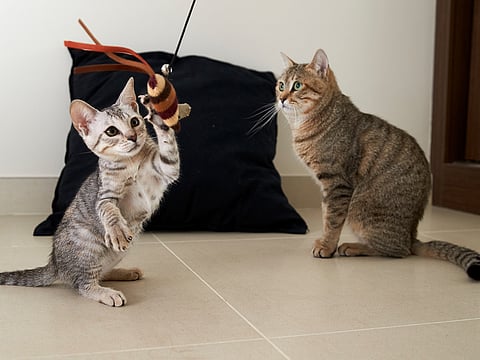Free course set up to help manage Abu Dhabi's stray cats
The course helps residents gain practical skills to support healthy, stable cat colonies

Dubai: Stray cats are a familiar sight in the UAE, napping in the shade of a neighbourhood bakala, trailing behind evening walkers, or being cared for by kind-hearted residents. But food and affection alone aren’t enough.
These cats face scorching heat, disease, and a daily struggle to survive. To better protect and support them, a new initiative has been launched, the Community Animal Training Course, a free open-access resource developed by Microchipped.ae, the free pet-tracking service, in collaboration with Animal Welfare Abu Dhabi (AWAD), a licensed non-profit organisation.
A training programme designed for UAE’s stray cats
The new Community Animal Training Course offers practical guidance tailored to the unique challenges faced by stray cats in the UAE and wider region.
“When we say the programme is tailored to our region, we mean it’s designed to address the specific conditions community cats face here in Abu Dhabi, such as extreme heat. Protocols are adjusted to ensure cats can be cared for safely in these conditions,” explained Dr Rachel J. Shaw, CEO of Animal Welfare Abu Dhabi (AWAD).
“Unlike other parts of the world, community cats here don’t suffer from heartworm and have very limited flea problems. But ticks are common, and they spread infectious diseases quickly. The programme gives clear guidance on how to manage these regional health risks effectively,” she added.
The training also outlines federal legislation and municipality-level recommendations for Abu Dhabi, ensuring volunteers and residents understand the correct, welfare-friendly ways to support community cats.
The most common mistake is feeding without sterilizing. Many people try to help by simply feeding community cats. While well-intentioned, this increases fertility - the cats are healthier, reproduce more, and the population grows even faster. At AWAD we refer to this as “feeding to breed.” In the course, we teach that feeding should always be guided by the Trap-Neuter-Vaccinate-Microchip-Return (TNVMR) principle.

Feeding without sterilising makes the problem worse
Many residents try to help by feeding stray cats. While well-intentioned, this often fuels overpopulation.
“At AWAD, we call this ‘feeding to breed’,” said Dr Shaw. “When cats are fed but not sterilised, they become healthier, reproduce more, and colonies grow even faster.”
The training emphasises the Trap-Neuter-Vaccinate-Microchip-Return (TNVMR) principle. Feeding is encouraged only as part of this cycle. To build trust so cats can be safely trapped, sterilised, vaccinated, microchipped, and returned.
Another common challenge is when caregivers become emotionally invested in a single sick or injured cat.
“Often, caregivers pour all their time, energy, and financial resources into saving that one cat, which can unfortunately lead to losing sight of the bigger picture – namely, long-term colony management through TNVMR. The course addresses this by helping participants understand the broader impact of their efforts,” Shaw added.
Also Read: Dina Taji offers a lifeline for stray cats
Building a community solution
According to David Appleby, founder of Microchipped.ae, the free pet-tracking platform behind the initiative, the course was created to meet a “real need” on the ground.
“Across Abu Dhabi, we’ve seen communities stepping up to help stray cats but often without the tools, knowledge, or support to do it safely and effectively. The course is designed to bridge that gap. It empowers everyday caregivers with practical skills and ethical guidance, so they can make a real difference without feeling overwhelmed or isolated,” Appleby said.
The course is open to everyone, whether you’re a long-time rescuer, a concerned neighbour, or someone who has only just started noticing the cats in your area.
This course was created to meet a real need on the ground. Across Abu Dhabi, we’ve seen communities stepping up to help stray cats but often without the tools, knowledge, or support to do it safely and effectively. The course is designed to bridge that gap. It empowers everyday caregivers with practical skills and ethical guidance, so they can make a real difference without feeling overwhelmed or isolated.

With many animal rescuers in Abu Dhabi already overburdened, the training aims to turn scattered individual efforts into coordinated community action.
“When communities understand how to care for cats safely and consistently, we see fewer injuries and healthier colonies. It also builds a sense of shared responsibility; people stop seeing stray cats as someone else’s problem and start becoming part of the solution. That shift is powerful, and it’s what this course is all about,” Appleby said.
What the training course covers
The course is divided into nine modules, each focusing on a key area of community cat care. Topics range from understanding cat behaviour and recognising feline diseases to safe feeding protocols, post-surgery monitoring after TNVMR procedures, and long-term strategies for maintaining healthy, stable colonies.
Each module is supported with visual guides and practical tips, allowing participants to apply what they learn directly in their own neighbourhoods.
The Community Animal Training Course is free and open to all UAE residents. Registration is available online at www.catraining.ae






